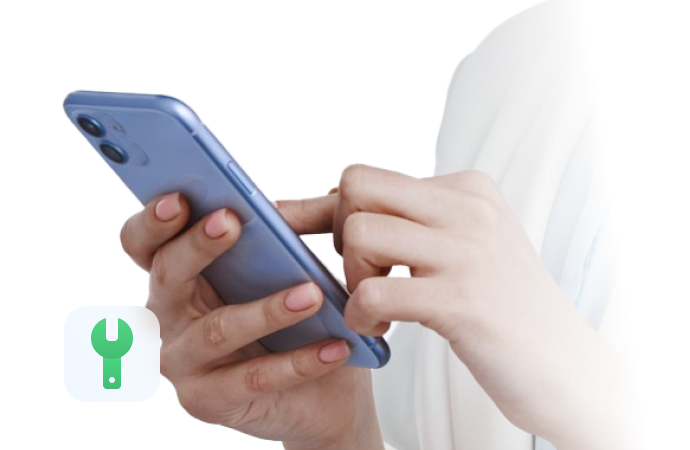
[Updated] TinyUmbrella Review: Features, Pros, Cons & Alternative
Aug 27, 2025 • Filed to: Phone Repair Solutions • Proven solutions
Many tools offer dedicated services when it comes to safeguarding your iOS device or resolving issues. TinyUmbrella has long been a trusted name among tech enthusiasts for this purpose. Known for its ability to save SHSH blobs and help with downgrading iOS firmware, this tool has become popular. However, as with any software, it comes with its strengths and limitations.
This review will dive deep into TinyUmbrella’s key features and explore how it helps users. You’ll also learn about its advantages, potential cons, and if it still stands as a top-tier solution for iOS devices. Additionally, we’ll compare TinyUmbrella to one of the best alternatives available.

Part 1.Complete Review of TinyUmbrella
TinyUmbrella has long been a go-to tool for iOS users looking to manage firmware and address device issues. This section takes a comprehensive look at what it offers, examining its core functionality. You will also learn its advantages and limitations and how to use it. Let's uncover what makes the TinyUmbrella download stand out and where it may fall short of meeting modern user expectations.
1. What Is TinyUmbrella
It is a specialized software tool designed to help iOS users manage their devices more effectively. Primarily used for firmware and recovery mode issues, TinyUmrella is widely recognized for its ability to save SHSH blobs. Doing this allows users to downgrade their iOS versions when needed. Originally popular among jailbreak enthusiasts, it also helps fix devices stuck in recovery mode or prevent accidental updates.

When you update your iDevice, a unique piece of data called the SHSH blob is stored on your device. This blob contains critical information specific to your phone and its firmware version. The TinyUmbrella software securely saves these SHSH blobs to an external file for future use. Apple typically allows only a week after an iOS update, during which downgrades are permitted.
After this period, SHSH blobs are no longer valid for downgrades. Without these blobs, reverting to an earlier firmware becomes impossible. By preserving your SHSH blobs with TinyUmbrella, you can later transform them into custom firmware. It lets you downgrade your device to a compatible iOS version using iTunes.
2. Is TinyUmbrella Free?
This software is free to download and use, making it an accessible solution for iOS users without incurring extra costs. Its developers have maintained a zero-cost model, ensuring that users can access its core features. Users can download TinyUmbrella to save SHSH blobs and fix recovery mode issues without paying for a subscription or license.
3. Benefits and Drawbacks of Using TinyUmbrella
While the tool offers a range of powerful features for iOS device management, it also has limitations. Understanding the software's strengths and weaknesses can help you determine if it meets your needs. Here are a few major benefits and drawbacks of using Tiny Umbrella iOS:
Pros
- Providing all its features at no cost, it emerges as an attractive option for budget-conscious users.
- The tool excels at saving SHSH blobs, enabling users to downgrade to older iOS versions when necessary.
- It has a simple interface and low system requirements, even on older computers, ensuring smooth performance.
- This program supports both macOS and Windows, allowing a wide range of users to access its features.
Cons
- The tool has not been updated since 2015, thereby restricting its compatibility.
- Users may struggle to find assistance as TinyUmbrella lacks official customer service or comprehensive documentation.
- While useful for specific tasks, it doesn’t offer advanced features found in other iOS management tools.
- The technical nature of tasks like saving SHSH blobs may intimidate non-expert users.
- It's only compatible with older iOS versions (7-12), not modern ones.
4. How To Use TinyUmbrella | Step-by-Step Guide
Designed specifically for iOS device management, its core functionalities are SHSH blob preservation, recovery mode exit, and firmware downgrading. While TinyUmbrella Windows 10 is a straightforward tool, following a step-by-step guide ensures a smooth experience. This application requires the most recent Java software to function. The following detailed instructions can aid you in learning how to use it:
Exit Recovery Mode
Instructions. Get TinyUmbrella running on your system and attach the targeted iOS device. Once the program detects the phone, you will receive a prompt about detecting a device in Recovery Mode. Here, tap the "Exit Recovery" button and wait for the program to turn off the mode on your mobile.

Save SHSH Blobs
Instructions. As you link your iDevice to your system, launch TinyUmbrella and wait for it to detect the device. Once it does, the tool will automatically start saving the SHSH blobs on your system as an external file. You can also press “Save SHSH” if the program doesn’t do this on its own.

Downgrade iPhone and iPad
Step 1. To begin, you will need to create a folder called “Pwnage” on your system and download TinyUmbrella to move it there. Now, download the targeted iOS version IPSW file and move it to the same folder.

Step 2. Then, use an appropriate cable to attach your iDevice to the system and launch the program. Following that, tap “Start TSS Server” and open iTunes if it runs successfully.

Step 3. Next, you need to put your iOS device into DFU Mode using one of the following guides:
iPhone 6 and Earlier:
Step 1. . Link your phone via a USB cable and engage the “Sleep/Wake” button to maintain the hold for 3 seconds. Then, proceed to hold down the “Home” button and keep pressing them both for 8 seconds.
Step 2. . Now, let go of the "Sleep/Wake" button while keeping pressure on the "Home" button to maintain this action until the screen remains black. The device screen will remain blank if done correctly, and iTunes will send you a prompt.

iPhone 7 Series:
Step 1. . Attach your mobile and simultaneously push down the “Sleep/Wake” and “Volume Down” buttons to maintain pressure on both. Then, let go of the “Sleep/Wke” button after 8 seconds while continuing to apply force to the “Volume Down” key.

Step 2. . The device screen will remain completely black if the device has entered DFU Mode. Otherwise, you will need to do the steps again to activate the mode on your mobile.
iPhone 8 and Later:
Step 1. . After linking your phone, quickly interact with the “Volume Up” button by performing a tap-and-release interaction. Next, immediately follow by repeating the same with the “Volume Down” key.
Step 2. . Following that, keep the "Side" button held down until the screen darkens completely. Then, proceed to tap the "Volume Down" button and keep both buttons pressed for the next 5 seconds.

Step 3. . Lastly, let go of the "Side" key and maintain pressure on the "Volume Down" key until the screen becomes blank. You'll receive a notification if you have iTunes/Finder open to indicate that the mode is active.
Step 4. Within iTunes, move to the device “Summary” tab and tap the “Restore iPhone” option. While doing so, ensure that you have held the “Shift” key for Windows or the “ALT” key for Mac.

Step 5. Afterward, choose the IPSW file from the “Pwnage” folder to commence the downgrading process. Follow the on-screen prompt carefully to complete the process successfully.

Part 2. One-Click iOS System Repair Alternative to TinyUmbrella To Repair Complex iOS Problems
For those seeking an efficient solution for iOS system issues, TinyUmbrella for iPhone may not always suffice. Advanced tools can simplify the process with enhanced features, providing a faster and better repair experience. One such option is Dr.Fone - System Repair (iOS), a professional-grade tool designed to resolve a wide range of iOS system problems.
It caters to users of all expertise levels, offering intuitive steps to fix all major issues. From failed iOS updates to fixing system errors, this tool can address virtually any iOS challenge. Dr.Fone – System Repair (iOS) goes beyond mere repairs by allowing users to upgrade or downgrade their iOS system without jailbreak.
Besides, its ability to support beta iOS versions gives users early access to new features while maintaining stability. Additionally, it features options like a one-click recovery or DFU mode exit and comprehensive reset.

Dr.Fone - System Repair (iOS)
One-Click iOS System Repair Alternative to TinyUmbrella To Repair Complex iOS Problems
- Only fix your iOS to normal, no data loss at all.
- Fix various iOS system issues stuck in recovery mode, white Apple logo, black screen, looping on start, etc.
- Upgrade and Downgrade iOS without iTunes at all.
- Work for all iPhone/iPad/iPod Touch, running on all iOS versions
Quick and Simplified Tutorial on How To Repair All Complex iOS Problems
It serves as a robust alternative to TinyUmbrella, offering convenience for managing even the most complex iOS issues. You can fix problems like device freezing, black screens, and DFU or recovery mode errors. Follow these quick instructions to repair all firmware issues you are facing:
Step 1. Proceed to iOS Repair and Activate Recovery Mode
Install and launch Dr.Fone – System Repair (iOS) on your system and attach your problematic iOS device. Now, approach and select “System Repair” from the “Toolbox” tab and opt for “iOS” on the following screen. From the repair menu, click “iOS Repair” and choose “Standard Repir” as the preferred mode to proceed. At this point, Recovery Mode activation is needed with the help of the “Enter Recovery Mode” button.
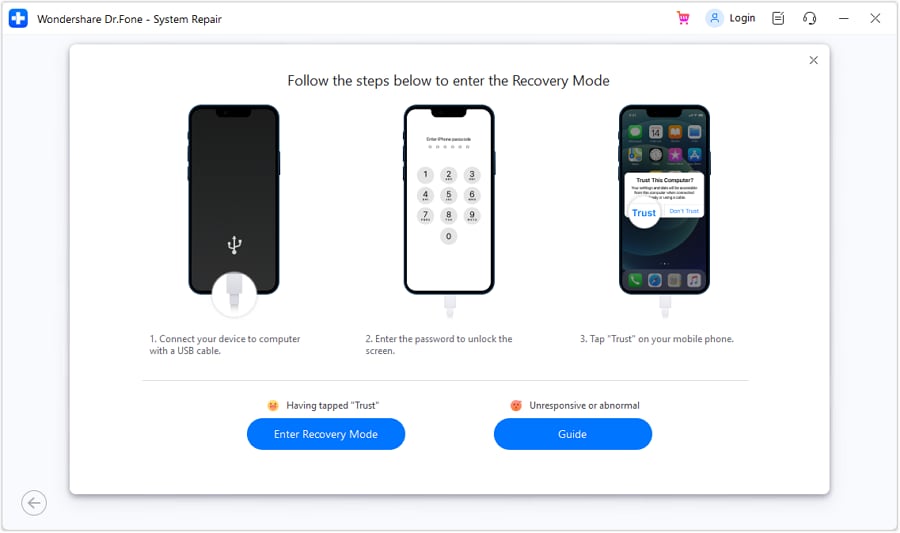
Step 2. Get the Desired Firmware Version to Repair System Issues
Following that, tap “Download” in front of the iOS system version of your choice and wait for it to download. Once the firmware file has been verified and made ready for use, hit the “Repair Now” button. It will take a few moments to complete the process of fixing all iOS issues with your iDevice.
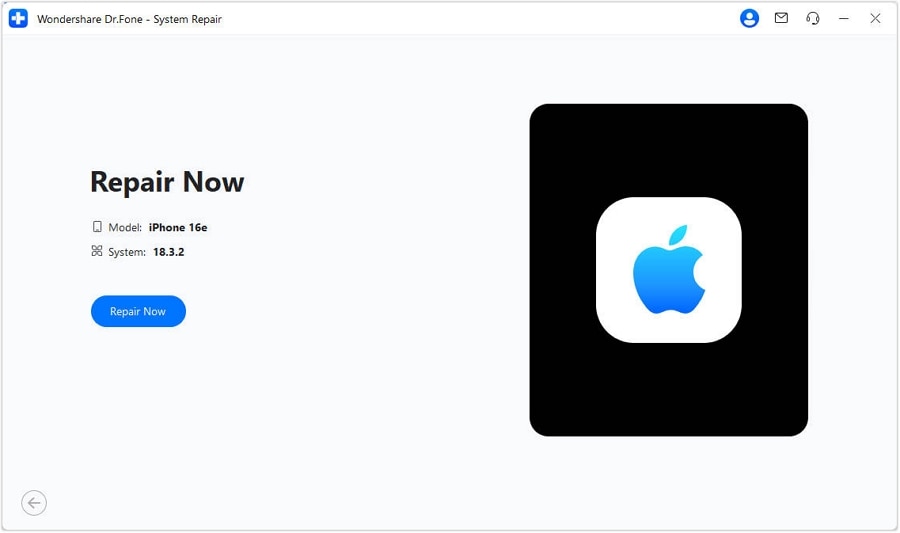
4,624,541 people have downloaded it
Part 3. Detailed Tabular Comparison Between TinyUmbrella and Dr.Fone – System Repair (iOS)
A direct comparative analysis can help clarify their strengths and limitations if you're unsure which tool best suits your needs. Both TinyUmbrella iPhone recovery and Dr.Fone - System Repair (iOS) serve as valuable resources, but they cater to different needs. To make an informed decision, let’s delve into a detailed comparison of these tools using the table below:
|
Feature |
TinyUmbrella |
Dr.Fone - System Repair (iOS) |
| Primary Function | iOS downgrade and exit Recovery Mode | Repairs a wide range of iOS issues, including black screen, boot loops, and more. |
| Fix Recovery/DFU Mode | Yes, limited to exiting recovery mode | Yes, supports exiting recovery and DFU modes easily |
| Repair Complex iOS Issues | No | Yes, handles system crashes, frozen screens, and more |
| Save SHSH Blobs | Yes, allows saving SHSH blobs for downgrades | No, does not support SHSH blob management |
| Upgrade/Downgrade iOS | Limited, requires SHSH blobs | Yes, no blobs are needed; it also includes beta iOS upgrades |
| Reset iOS Devices | No | Yes, allows resetting devices securely |
| User Interface | Basic and technical may overwhelm beginners | Intuitive and beginner-friendly |
| Compatibility with Latest iOS | Limited, iOS 7 to iOS 12 | Fully compatible with the latest iOS versions |
| Cross-Platform Support | Yes | Yes |
| Customer Support | None. relies on community forums | Yes, offers dedicated customer support |
| Pricing | Free | Paid |
This comparison highlights the strengths of each tool. TinyUmbrella fix recovery is a cost-effective option for specific tasks like saving SHSH blobs. In contrast, Dr.Fone - System Repair (iOS) is a more robust solution for comprehensive system repair. Your choice depends on whether you prioritize simplicity and advanced functionality or a more niche-focused, free tool.
Conclusion
In summary, TinyUmbrella remains a useful tool for iOS users seeking basic solutions like saving SHSH blobs or exiting recovery mode. Its outdated updates and lack of advanced features may hinder its usability for modern iDevices. For a more comprehensive experience, Dr.Fone - System Repair (iOS) stands out as a superior alternative.
This advanced program has the ability to repair complex system issues and upgrade/downgrade iOS without SHSH blobs. That makes it an all-in-one and a trusted solution for iOS device management. If you value versatility and ease of use, Wondershare Dr.Fone is the clear choice.
4,624,541 people have downloaded it
iPhone Errors
- Errors 0 ... 100
- 1. iPhone Error 6
- 2. iPhone/iTunes Error 9
- 3. iPhone Error 10
- 4. iPhone/iTunes Error 21
- 5. iPhone Error 35
- 6. iTunes Error 40 on iPhone/iPad
- 7. iPhone Error 47
- 8. iPhone Error 69
- 9. iPhone Error 75
- 10. iPhone Error 78
- Errors 1xxx
- 1. iPhone Error 1009
- 2. iPhone Error 1015
- 3. iPhone/iTunes Error 1100
- 4. iPhone Error 1110
- 5. iPhone Error 1667
- Errors 2xxx
- Errors 3xxx
- 1. iTunes Error 3004
- 2. iTunes Error 3014
- 3. iTunes/iPhone Error 3194
- 4. iPhone Error 3503
- 5. iPhone/iTunes Error 3600
- Errors 4xxx
- Other iPhone Errors
- 1. iPhone Error 7005
- 2. iPhone/iTunes Error 9006
- 3. iPhone Error 0xe8000015
- 4. iPhone Cellular Update Failed Error
- 5. iPhone Activation Error
- 6. iPhone SSL Error
- Other iPhone Issues
- ● Manage/transfer/recover data
- ● Unlock screen/activate/FRP lock
- ● Fix most iOS and Android issues
- Repair Now Repair Now Repair Now
















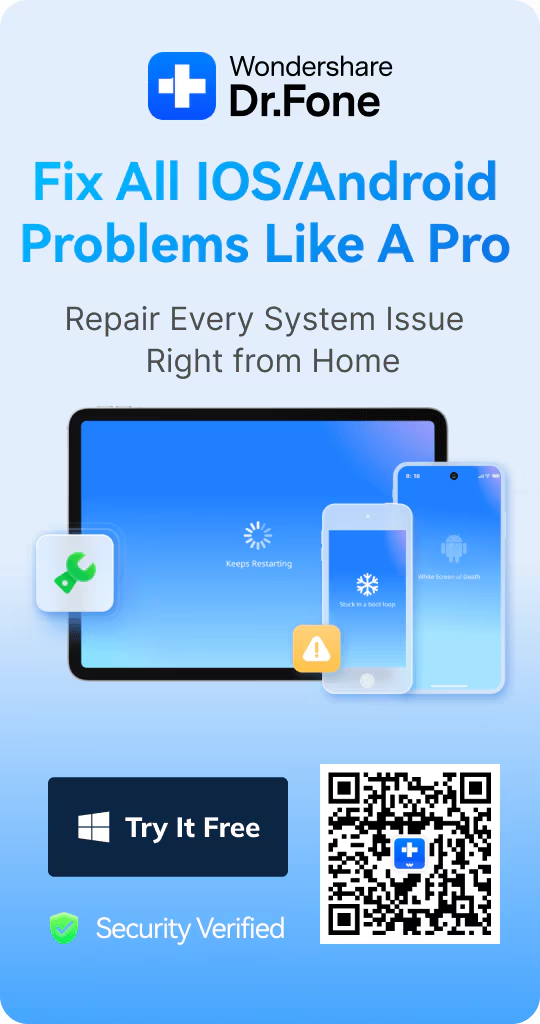
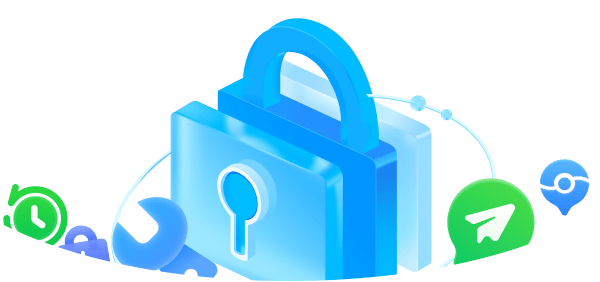
James Davis
staff Editor
Generally rated4.5(105participated)